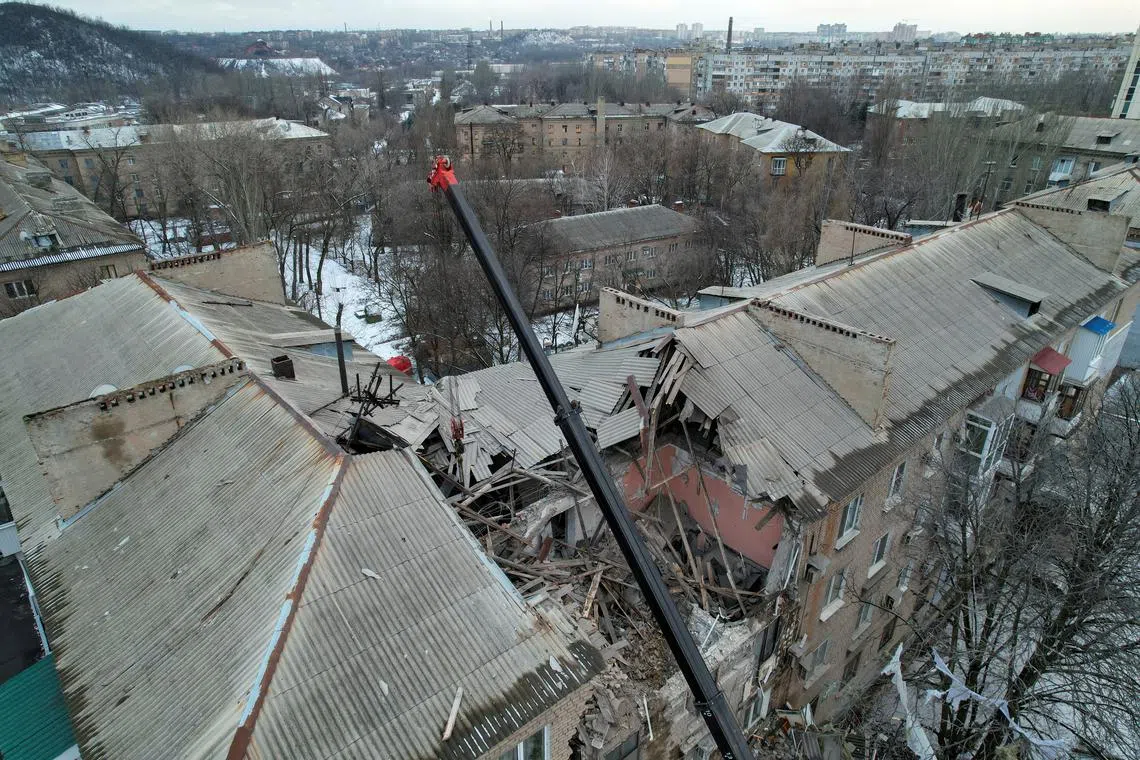China’s call for Ukraine ceasefire rebuffed by Kyiv
Sign up now: Get ST's newsletters delivered to your inbox

Rescuers using a crane on Feb 4 to remove debris in a residential area in Donetsk that was hit by shelling.
PHOTO: REUTERS
BEIJING – China called for a comprehensive ceasefire in Ukraine on Friday as part of a 12-point plan for dealing with the war, a proposal Kyiv rejected unless it involved Russia withdrawing its troops to its 1991 borders.
On the first anniversary of Russia’s invasion of Ukraine, Moscow’s ally Beijing urged both sides to agree to a gradual de-escalation, warned against the use of nuclear weapons, and said conflict benefited no one.
The plan, set out in a Foreign Ministry paper, was largely a reiteration of China’s line since Russia launched what it calls its “special military operation” on Feb 24, 2022.
China has refrained from condemning its ally Russia or referring to Moscow’s intervention in its neighbour as an “invasion”. It has also criticised Western sanctions against Russia.
“All parties must stay rational and exercise restraint, avoid fanning the flames and aggravating tensions, and prevent the crisis from deteriorating further or even spiralling out of control,” the ministry said in its paper.
Chinese President Xi Jinping is expected to deliver a “peace speech” late on Friday to mark the anniversary. The Foreign Ministry said it had no information on the speech.
Ukrainian President Volodymyr Zelensky’s government has said it would fight until Russia leaves its borders, and Moscow has shown no sign of stopping its attacks.
Ukraine and other countries are also unlikely to view China as an impartial mediator to end a war that has killed tens of thousands of people and driven millions from their homes.
On Thursday, China abstained from a United Nations resolution calling for an end to the war.
The Ambassador of the European Union to China, Mr Jorge Toledo Albinana, said China’s paper was not a peace proposal, but the EU would study it closely.
Speaking at a briefing for reporters in Beijing, Mr Toledo noted the EU’s concern that the paper did not mention an aggressor, and said China had a special responsibility to defend and uphold the values of the UN Charter.
At the same briefing, Ukraine’s charge d’affaires Zhanna Leshchynska called China’s paper “a good sign”, but added that her country hoped China would also urge Russia to stop the war and withdraw its troops.
Asked to what extent she believed China had maintained neutrality in the conflict, Ms Leshchynska said: “If it is neutrality, then China should talk to both sides, Russia and Ukraine. Now we see the Chinese side mostly talking to Russia, but not with Ukraine.”
Chinese President Xi Jinping has yet to talk with Mr Zelensky since the invasion, despite speaking with Russian President Vladimir Putin on about four occasions in that time.
“Any ‘peace plan’ with ceasefire only and, as a result, a new delimitation line and continued occupation of Ukrainian territory isn’t about peace, but about freezing the war, a Ukrainian defeat (and the) next stages of Russia’s genocide,” Mr Zelensky’s political adviser Mykhailo Podolyak wrote on Twitter.
The plan also cut little ice with Nato. “China doesn’t have much credibility because they have not been able to condemn the illegal invasion of Ukraine,” Nato secretary-general Jens Stoltenberg told reporters in Tallinn.
China’s Foreign Ministry spokesman Wang Wenbin said critical comments on the paper from some diplomats had no basis and were aimed at smearing China. “It would be better if they reflected on whether they have done anything for the political resolution of the Ukraine crisis,” he told a regular briefing.
The US marked the first anniversary of Russia’s invasion of Ukraine on Friday by announcing new sanctions against Russia and its allies, new export controls and tariffs aimed at undermining Moscow’s ability to wage war.
Washington also said it would provide another US$2 billion (S$2.7 billion) in weaponry for Kyiv as it prepares for a spring offensive. The aid did not include F-16 fighter jets that Ukraine had requested.
The sanctions are aimed at targets in Russia and “third-country actors” across Europe, Asia and the Middle East that are supporting Russia’s war effort, the White House said in a fact sheet.
“We will sanction additional actors tied to Russia’s defence and technology industry, including those responsible for backfilling Russian stocks of sanctioned items or enabling Russian sanctions evasion,” it said.
On Thursday, US Secretary of State Antony Blinken said Beijing probably approved of Chinese companies providing Russia with non-lethal, “dual-use” support for its war in Ukraine, remarks that underscore growing US concern that Beijing may help arm Mr Putin’s forces.
China has rejected the allegations and accused the US of fanning the conflict by providing weapons to Ukraine.
The White House earlier warned Beijing against providing lethal aid to Russia after US officials revealed concerns about intelligence that China is considering doing so. Officials have not said what the consequences would be for Beijing, but that they consider it a red line that must not be crossed.
Mr Zelensky said on Thursday he wanted to meet with Beijing over their proposal before assessing it. “We’ll draw some conclusions after we see the specifics of what they offer... We would like to have a meeting with China,” he said. REUTERS, AFP


